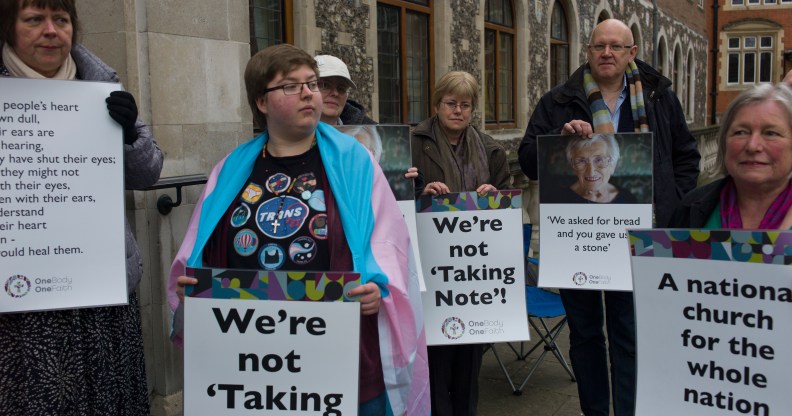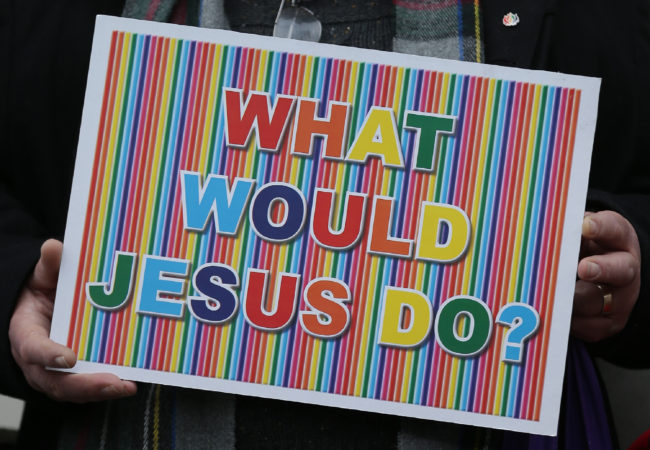Church of England tells clergy to respect trans people’s affirmed names

The Synod considers and approves legislation affecting the whole of the Church of England, formulates new forms of worship, debates matters of national and international importance, and approves the annual budget for the work of the Church at national level. (Dan Kitwood/Getty)
The Church of England has issued new guidelines on celebrating the baptism of transgender people.
The document, titled “Pastoral Guidance for use in conjunction with the Affirmation of Baptismal Faith in the context of gender transition,” was approved by the House of Bishops and published on December 11 on the Church of England’s website and will be incorporated into Common Worship.
The need for guidelines on the matter of gender transition was raised during the General Synod of the Church of England in July 2017, which passed a motion calling for “the preparation of liturgical materials to mark a person’s gender transition.”
“It is important that the occasion should have a celebratory character.”
The new guidelines state the Church of England’s “unconditional affirmation of trans people” and advise ministers to “respond sensitively and creatively to the person’s circumstances,” reminding the clergy to respect believers’ individual wishes on the matter of their gender identity.
“Trans people are as diverse as any other social group and ministers should avoid stereotyping. It is appropriate, however, to identify the preference of a transgender person in respect of their name and gendered (or other) pronouns. It should be noted that the term ‘transgender’ is typically preferred to transgendered,” the guidelines read.

A demonstrator holds a placard as they protest outside Church House, the venue of the Church of England’s General Synod, in London on February 15, 2017. (Daniel Leal-Olivas/AFP/Getty)
Another point reinforces the need for the ceremony to have a “celebratory” character, respecting the person’s preferences with regards to mentions of their past.
“It is important that the occasion should have a celebratory character, and in preparation for the service, the minister will wish to meet with the candidate to understand better their personal journey. The minister should be guided by the wishes of the candidate regarding the way in which past experiences may be mentioned or reflected upon, either in the introduction to the service or if the candidate is to share their testimony,” the guidelines read.
Church of England guidelines written by trans clergy members
Among the recommended Gospel readings for the rite, one of the most important ceremonies in Christianity, stands out one passage that reinforces the idea that a person’s gender—or ethnicity, or social status—does not matter when it come to baptism.
“There is no longer Jew or Greek, there is no longer slave or free, there is no longer male and female; for all of you are one in Christ Jesus,” states the Gospel reading, Galatians 3:27-4:7.
The trans clergy, Reverend Dr Tina Beardsley, Reverend Sarah Jones and Reverend Canon Dr Rachel Mann, produced the guidelines following consultation with those directly affected and their clergy.
“For me the most important thing was actually having this certificate to say that I had renewed my baptism vows and it had my chosen name on it,” Reverend Beardsley told the BBC.
The Bishop of Blackburn, Julian Henderson, Chair of the House of Bishops Delegation Committee, that oversaw work to produce the guidance, said in a statement: “This new guidance provides an opportunity, rooted in scripture, to enable trans people who have ‘come to Christ as the way, the truth and the life,’ to mark their transition in the presence of their Church family which is the body of Christ.
“We commend it for wider use.”

